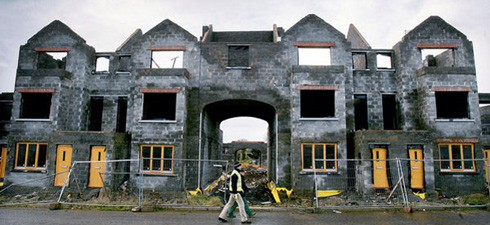Irish nerves are frayed these days in Dublin. First bleary-eyed Taoiseach Brian Cowen mumbles something incomprehensible about future cost-cutting measures. Meanwhile, doubts are spreading about his ability to handle the crisis. And then the financial markets are all a-buzz with speculation about an Irish insolvency. In a word, an explosive mix of economic and political crises.
Investors have now valiantly stepped into the breach to snap up auctioned-off government bonds, which gives the administration some breathing space. But Dublin will have to pay steep interest on those loans. Rumours that Cowen of the Fianna Fail party is overwhelmed and might step down are compounded with speculations about the island republic going broke. This eurozone country’s financial fix is bedevilling the single currency, fuelling fears that Ireland might prove a second Greece. That could doom the prospects for a more stable economic recovery in Euroland.
In the meantime, Irish finance minister Brian Lenihan, already touted as Cowen’s presumptive successor, is fighting a rearguard action to save the country’s reputation. He can take wisecracks about his country, even aspersions. But that Patrick Honohan of all people, governor of the Irish central bank, should warn that the government is not doing its homework and could fall short of its austerity targets, has cut Cowen to the quick. The whole scaffolding he has put up to brace the nation’s financial edifice is likely to come crashing down.
Worse than America
It’s still unclear how much it will cost the state to bail out the beleaguered banks, especially the Anglo Irish Bank, which can only be wound up now anyway. The bank, which lost a fortune speculating on property loans, is a billion-euro grave. Ireland has already put about 20% of its entire economic output into guarantees and aid to the financial sector. To make matters worse, new borrowing last year came to 14.3% of gross domestic product (GDP) – which sets a sad record in the eurozone. And this year’s deficit will again exceed the 3%
The main cause of the predicament is the Irish banks’ massive mis-investments in the real estate market. The state, with its 4.5 million inhabitants, is now awash with tens of thousands of vacant buildings. Irish property owners are groaning under the yoke of heavy private debt, which averages 175% of disposable income per household. That even beats America, where the figure comes to 145%.
Uniform tax policy
But not all Ireland’s troubles are of their own doing. For years Brussels extolled the Irish growth model, which is based on a largely unregulated capital market combined with unbeatably low taxes on banks and companies. Billions in subsidies helped to cover up sources of friction, like the rift between Dublin’s rapid economic takeoff and slow growth in poorer rural areas. Truth to tell, the erstwhile Celtic Tiger had already been reeling with a dangerous virus for some time. The name of the bug: growth at any price. The international financial crisis has now finished Ireland off.
Fingers are now wagging away in Brussels and the eurozone. The Irish, they say, had better pull themselves together and retrench for all they’re worth. Actually, however, the Irish problem is also a European problem that goes far beyond fiscal discipline and adherence to the stability pact. The eurozone has failed to elaborate a consistent economic model for its peripheral nations. That model ought to include a uniform business tax policy as well as an end to scattershot subsidies. Otherwise new bubbles will form and grow big – and eventually burst.
Translated by Eric Rosencrantz
Do you like our work?
Help multilingual European journalism to thrive, without ads or paywalls. Your one-off or regular support will keep our newsroom independent. Thank you!
















